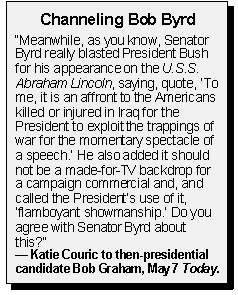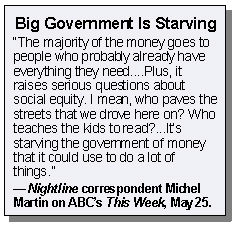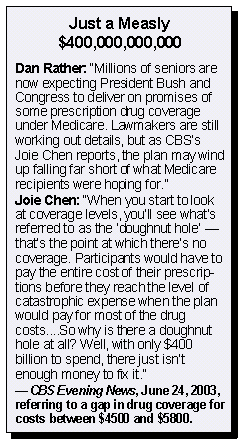 |
||||||||||||
|
||||||||||||
 |
||
|
 |
||||||||||||
|
||||||||||||
 |
||||||||||||||||||||||||||||||||||||
|
||||||||||||||||||||||||||||||||||||
|
Still Liberal, Still Biased
How Big Media Helped the Left and Hurt the Right in 2003
By Tim
Graham and Rich Noyes
January 2004
Section 3 of 6
|
May
But as Americans celebrated, the news media had a different feeling, nervously seeking to avoid looking too favorable to President Bush. Hours before the landing, NBC’s Matt Lauer suggested the White House was in danger of “symbolism overshadowing safety” with Bush piloting a plane. Immediate political analysis agreed that the photo opportunity was “A-plus-plus,” as ABC’s George Stephanopoulos said. But the images were quickly put through the meat grinder of election analysis. As they discussed how Michael Dukakis drew laughs in 1988 for riding in a tank, Diane Sawyer asked Stephanopoulos: “It sometimes can be tricky to be seen among the military, unless you can carry it off. How could you be sure? Do you think he [Bush] tried on the suit beforehand? Am I being too cynical?” Stephanopoulos replied, “No, I think he probably did.” By that evening, ABC substitute anchor Claire Shipman was hardly offering campaign ads for the White House: “We’ll have more on the reunion with eager loved ones in just a moment, but these soldiers, of course, are coming home to a sober reality as well. An economy that, if anything, is struggling more than it was when they set sail. The government said today the unemployment rate is up to six percent. More than half a million jobs were lost in the last three months.” Within a few days, Democratic office holders decided to undermine the aircraft-carrier images, and the networks joined the chorus without any apparent nervous moments about appearing too helpful. On the May 6 World News Tonight, ABC’s Peter Jennings highlighted that “California Congressman Henry Waxman is asking government auditors to figure out how much the trip cost the taxpayers and West Virginia Senator Robert Byrd said on the Senate floor today it was an ‘affront to the Americans killed or injured in Iraq for the President to exploit the trappings of war for the momentary spectacle of a speech.’” On the May 7 evening shows, CBS, CNN, and CNBC all jumped on the Byrd-Waxman bandwagon. CBS reporter John Roberts highlighted Waxman saying the trip was “a grandstanding cheap shot that wastes taxpayers’ dollars,” as well as historian James Thurber claiming the landing brings up “troubling thoughts about separation of the military from civilian rule.” On CNN’s NewsNight, anchor Aaron Brown spent 12 minutes on criticism of the Lincoln landing, resurrecting an old anti-Bush line: “Do you think any of the anger, if that’s the right word, that Democrats have, stems from the fact that the President was in the reserves during the Vietnam era and not in Vietnam itself?”
As the Iraq reconstruction effort has struggled, media outlets have continued to labor to turn around the public-relations value of the Lincoln landing. Time’s October 6 issue blared: “Mission NOT Accomplished: How Bush Midjudged the Task of Fixing Iraq.” But Bush’s “mission accomplished” wasn’t the complete democratic transformation of Iraq, but the successful removal of Saddam Hussein’s regime. Anchors reported with pounding regularity the death toll since the Lincoln landing. On November 11, Katie Couric announced: “There have been 152 soldiers killed in action since May 1st which was, marked the end of, of major combat operations. Prior to that date, 114 U.S. soldiers were killed in action.” By November, Newsweek editor Jon Meacham predicted: “I think no matter what happens in Iraq, we’re gonna see more of that flight suit in the landing on the Lincoln next year and the Mission Not Accomplished in Democratic ads than Republican ads.” TV Denounces Bush Tax Cut, Again: Final passage of the President’s tax cut in May was met with network bias on par with the hostile coverage that greeted the plan’s announcement in January. Despite the fact that Congress had reduced the size of the package to a mere $350 billion over ten years, or less than half the size of President Bush’s original proposal, CBS anchor Dan Rather persisted in echoing liberal tax cut critics who insisted it was a “big” tax cut. “In the U.S. Congress, House and Senate leaders today reached the outlines of what’s called a compromise deal on President Bush’s big tax cut plan,” Rather announced on the May 21 CBS Evening News. What Rather did not say was that $350 billion represented barely a 1 percent reduction in expected tax revenue to the federal government over the next ten years. Reporters also presented as fact the liberal argument that the tax cut rewarded the wealthy to the detriment of the poor. “Big winners are rich people and families with children,” ABC’s Linda Douglass asserted on the May 22 World News Tonight. “The top five percent of taxpayers would get more than half of the benefits from the tax cut. “ Liberal journalists continued to complain about the tax cut even after President Bush signed it into law on May 28. The next morning, the New York Times published a front-page story that was little more than a press release from the left-wing Center on Budget and Policy Priorities (CBPP). The group argued that the tax law was flawed and unfair because families earning between $10,000 and $26,000 would not get the increased child care credit from $600 to $1,000 because their tax bills had already been reduced to zero. For such families, any such “tax cut” would have actually been a bonus above and beyond all income tax paid. A few hours after the Times published its one-sided story, ABC’s Terry Moran sounded like a Democratic spinner as he took up the issue with White House press secretary Ari Fleischer at a televised briefing: “Is it fair to say that the White House...at the end of the day thought that to make progress, the benefit for these 11.9 million children should go in order to, in part, save the dividend benefit for investors?” His equally-slanted follow-up: “I just want to make sure that you are saying that the White House agreed to make the choice to leave these children behind.”
ABC’s Peter Jennings opened the May 29 World News Tonight by lamenting how “it turns out that a whole lot of people in the country who could use the money are not going to get it.” Linda Douglass presented the new tax law as supremely unfair: “Rhonda Williams is an office messenger raising two children alone. She thought she would be getting some extra money from a tax cut bill. She was wrong.” “The tax cut the President just signed will not help many who need help the most,” CBS Evening News anchor Jane Clayson fretted before Bill Plante profiled a woman who “earns just above the minimum wage, the kind of taxpayer the President says he wants to help. But she won’t be getting that refund check the President says is in the mail. An eleventh hour change in the tax bill prevents millions of low-income working Americans...from receiving an extra $400 child tax credit.” Like ABC, NBC made the subject its top story as Tom Brokaw led the NBC Nightly News by insisting that in what “could be an embarrassing omission in his tax cut package, families making between $10,000 and $26,000 a year come up short.” CNBC anchor Brian Williams employed similar language: “We learned today there is an embarrassing omission in what is now the law of the land. Families making between $10,000 and $26,000 a year get left out while critics say many who do not need a tax cut get one anyway.” One sign of how far out the networks were on this issue was how closely their spin matched that of PBS omnipresence Bill Moyers, whose left-wing sanctimony is made even more obnoxious by the fact that it is subsidized by taxpayers who would never freely support such radical nonsense. Two days after the tax bill became law, Moyers railed against its supposed cruelty on his regular Friday evening newsmagazine, Now. “It’s the richest Americans – the top one percent – who get the lion’s share of the tax cuts, people like Secretary of the Treasury John Snow, [and] Vice President Dick Cheney,” Moyers pontificated. “Eleven million children in families with incomes roughly between $10,000 and $26,000 a year will not be getting the check that was supposed to be in the mail this summer. Eleven million children punished for being poor, even as the rich are rewarded for being rich.”
June Network, Clamor for Even More Spending: Network reporters covering President Bush’s tax cuts were concerned with assessing the high “cost” and spelling out who would most benefit from the changed policy. But as the House and Senate passed bills in June authorizing a massive new pay-out for prescription drugs, the networks displayed little interest in outlining who would pay (those at lower incomes still working) and who would benefit (the elderly, the wealthiest age group). TV correspondents also rarely mentioned the price tag of the expensive new drug benefit, except in the context of amplifying critics who charged it was not nearly “enough.” As previously noted, Dan Rather on May 21 referred to the compromise tax cut, estimated at $350 billion before it “sunsets” after ten years, as “President Bush’s big tax cut plan.” Less than three weeks later, on June 10, Rather did not mention the cost of the prescription plan or refer to it as “big” although it will cost much more — $400 billion over the first ten years and, because there was no sunset provision, and trillions more thereafter. Instead of fretting about the price tag, Rather portrayed it as long overdue: “In Washington today, for the umpteenth time, there’s talk of a possible compromise deal to provide at least some prescription drug coverage for people on Medicare. CBS’s Joie Chen reports what’s different this time as millions of older Americans wait for action.” Chen chronicled how paying for prescriptions is a “daily concern” at senior center before she trumpeted how “some badly needed help may be on the way, a $400 billion plan outlined today would give all seniors a prescription drug benefit.” The next morning on Today, NBC’s Campbell Brown stressed the plan’s inadequacies: “The cost of the plan, $400 billion. But advocates for seniors, like the powerful American Association for Retired Persons, say it’s still not enough.” So did ABC’s Linda Douglass that night on World News Tonight: “Senators voted earlier this year to limit the cost of any plan to $400 billion over 10 years....Democrats complain that a third of seniors will still be stuck with big bills.” As the bill moved to the Senate the following week, the networks ignored conservative critics who opposed the expensive new entitlement. Instead, TV coverage contrasted supporters of the new giveaway with detractors who wanted an even larger handout. “The Senate begins debate today on what would be the biggest expansion of Medicare benefits in its history,” NBC’s Ann Curry summarized on the June 16 Today. “If the bill passes prescription drugs would be subsidized for all 40 million members for the first time. Critics say the drug benefit isn’t enough.” On Good Morning America the same day, ABC’s Tony Perkins shared Curry’s agenda when he interviewed Health and Human Services Secretary Tommy Thompson: “Some have said this bill doesn’t go quite far enough — it’s more of a start than a long-term solution. Do you agree? How do you address those concerns?” Not even Massachusetts Senator Ted Kennedy was generous enough for CNN’s Judy Woodruff. Interviewing the legendary liberal on June 18, she suggested he was shortchanging old people: ”I began by asking him about his signing off on a plan that would leave some seniors with less drug coverage than they need and whether he undercut those seniors.” She also reprimanded Kennedy for supposedly aiding a conservative: “At a time when the Democrats are trying mightily to carve out distinct positions for themselves against a very popular Republican President,” she scolded, “what you have done is helped a Republican President take a very controversial issue off the table.” Woodruff was no doubt pleased that Kennedy opposed the final Medicare reform bill passed by Congress in November. Network reporters took their cue from liberal groups who wanted an even more expansive program. On NBC Nightly News June 23, Norah O’Donnell showed a complaining John Rother, Policy Director for the American Association of Retired Persons: “People are disappointed that there isn’t more of a benefit here. And sometimes they’re mad. Sometimes they think, well, at least it’s a first start. But everyone is disappointed.” Then, O’Donnell fleshed out Rother’s argument by displaying a victim: “Like 77-year-old Pat Roussos of Connecticut, who suffers from arthritis, diabetes and high blood pressure. Her out-of-pocket drug costs now, as much as $6,500 a year.” The story then included a soundbite from a pessimistic Pat Roussos: “It’s only a start, and I’m not convinced it’s going to go very far.”
Where were the critics arguing that the entitlement’s projected $400 billion cost was too much of a burden on taxpayers? The Heritage Foundation’s Stuart Butler described the bill as “an impending disaster for all Americans” in a June 13 research memo. And in a June 24 Wall Street Journal op-ed, economists Andrew Rettenmmaier and Thomas Saving estimated that “the new benefits will create an unfunded liability of $7.5 trillion, or almost twice the current debt held by the public.” But the budgetary implications of such massive spending was apparently not “newsworthy” to the same network reporters who worried about how much the tax cut would increase the deficit. Media See Legal Battle as Conservatives vs. "Rights": As the supposedly Bush-favoring, conservative-tilting Supreme Court came to the end of its term in June, the headline-grabbing decisions were more pleasing to liberals — even though the networks didn’t seem to find anyone who fit that label. On June 23, the Court ruled largely in favor of allowing the use of racial criteria in admissions at the University of Michigan, both for undergraduates (the Gratz case) and law school applicants (the Grutter case), but no one called the racial-quota supporters “liberals.” It helped that military officers and corporate chieftains — each seen as stereotypically right-wing — filed supportive briefs in favor of, to use the media code word, “affirmative action.” Liberals favored “affirmative action,” while conservatives were often cast as “opponents of affirmative action.” During live coverage of the decision, ABC’s John Cochran relayed from the White House that the two sides of the debate were “conservatives,” and on the left, “civil rights supporters.” He explained that President Bush took “the side of the white plaintiffs in this case. That angered many civil rights supporters around the country and it pleased very much a lot of conservatives. However, when the administration actually filed its brief, it was much narrower than conservatives have wanted.” That approach was also employed in dividing the Court. On CNN, legal analyst Jeffrey Toobin explained “Affirmative action has become a mainstream cause, and that’s why Sandra Day O’Connor, a mainstream justice, voted the way she did.” On CBS’s The Early Show the next morning, reporter Bob Orr found an unlabeled Sandra Day O’Connor voted for a “narrowly tailored” use of race, but “the Court’s conservatives dissented.” On June 26, the Supreme Court voted 6-3 in Lawrence v. Texas to strike down state laws against sodomy, and again, the networks split the case into “gay rights activists” and “conservatives” — or worse. ABC led off with Jackie Judd, who found “activists literally cried for joy,” while “social conservatives mourned today’s ruling.” Legal reporter Cynthia McFadden followed suit: “Those in favor of gay rights considered the opinion a triumph...while on talk radio, conservatives called the decision a travesty.” McFadden concluded: “Gays and lesbians are clearly encouraged, but given some of the ferocious language on the other side, full equality may be a good ways off.” The next morning, Good Morning America reran the Judd story, but anchor Dan Harris added an introduction also pitting “gay rights activists” against “conservative groups.” On CBS, reporter Richard Schlesinger said the gay Texas plaintiffs were “reluctant symbols for gay rights activists who are ecstatic with the decision....Conservative groups quickly condemned the decision.” In a second story, reporter Bob McNamara described talk show host Marlin Maddoux as one who has “championed conservative causes for years, and he concluded that “conservatives” were already promising to “undo the controversial ruling.” On NBC, legal reporter Pete Williams led off with how “Gay rights groups were jubilant,” while “Conservative groups today roundly criticized the ruling as overreaching.” Next, reporter Roger O’Neill found only one fringe: “On the extremes, Rush Limbaugh lambasting the court, agreeing with Justice Anthony [sic] Scalia’s dissenting opinion that the court has taken sides with gays in America’s cultural wars.” These legal controversies underline how the media slants its coverage of social issues. On the epic political battles of our time, the sides are portrayed as the civil rights activists versus the “ferocious” conservative opponents “on the extremes.”
The Media Research Center For an interview with an MRC Spokesman, please contact Katie Wright at (703) 683-5004
Home | News Division
| Bozell Columns | CyberAlerts |
||||||||||||





 Reporters Tout Democrat Spin
on Lincoln Landing:
On May 1, President Bush marked the end of “major combat operations” by landing a plane on the
U.S.S. Abraham Lincoln. Later that day, he gave a prime-time address celebrating the end of the war. He praised the American armed forces: “Your courage, your willingness to face danger for your country and for each other, made this day possible. Because of you, our nation is more secure. Because of you, the tyrant has fallen, and Iraq is free.”
Reporters Tout Democrat Spin
on Lincoln Landing:
On May 1, President Bush marked the end of “major combat operations” by landing a plane on the
U.S.S. Abraham Lincoln. Later that day, he gave a prime-time address celebrating the end of the war. He praised the American armed forces: “Your courage, your willingness to face danger for your country and for each other, made this day possible. Because of you, our nation is more secure. Because of you, the tyrant has fallen, and Iraq is free.” On CNBC, reporter Norah O’Donnell was screening every penny spent on the trip: “Democrats claim the event may have cost up to one million dollars in taxpayer funds, including an estimate that $200 was spent to outfit the President in a custom-fitted flight suit.” Unlike reporters on CBS, CNN, and FNC, O’Donnell failed to relay Navy denials of any cost approaching $1 million.
On CNBC, reporter Norah O’Donnell was screening every penny spent on the trip: “Democrats claim the event may have cost up to one million dollars in taxpayer funds, including an estimate that $200 was spent to outfit the President in a custom-fitted flight suit.” Unlike reporters on CBS, CNN, and FNC, O’Donnell failed to relay Navy denials of any cost approaching $1 million. That night, ABC, CBS, CNBC, CNN and NBC all broadcast stories treating the exclusion as evidence of the supposed unfairness of the income tax cut. But CNBC, NBC and CNN never clued viewers in on how those in the affected income range pay little, if any, income tax while ABC and CBS only mentioned that fact late in their stories — after delivering profiles of supposed “victims” who will not get an extra check from the U.S. Treasury.
That night, ABC, CBS, CNBC, CNN and NBC all broadcast stories treating the exclusion as evidence of the supposed unfairness of the income tax cut. But CNBC, NBC and CNN never clued viewers in on how those in the affected income range pay little, if any, income tax while ABC and CBS only mentioned that fact late in their stories — after delivering profiles of supposed “victims” who will not get an extra check from the U.S. Treasury. NBC failed to tell viewers that Roussos was not a random senior citizen, but is the Connecticut Community Coordinator for AARP, the official who oversees the state’s 72 local chapters. The next night, CBS echoed the same complaint, that the $400 billion price tag was just too small to provide proper relief to senior citizens (see box).
NBC failed to tell viewers that Roussos was not a random senior citizen, but is the Connecticut Community Coordinator for AARP, the official who oversees the state’s 72 local chapters. The next night, CBS echoed the same complaint, that the $400 billion price tag was just too small to provide proper relief to senior citizens (see box).